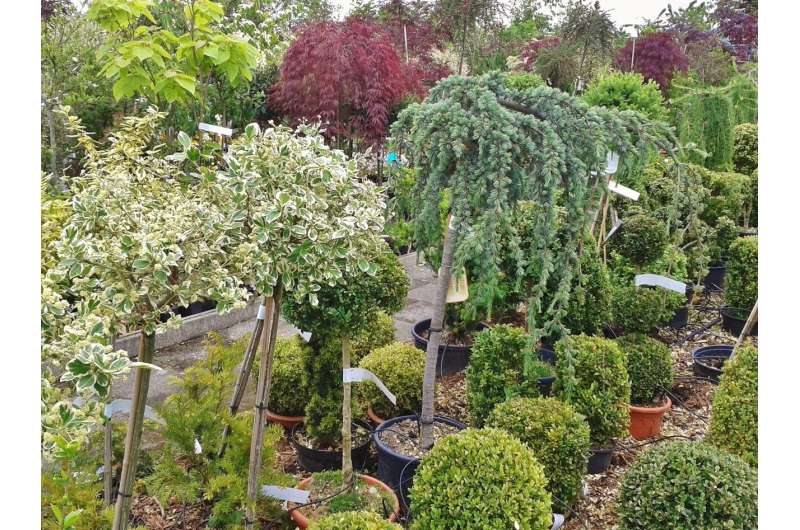This article has been reviewed according to Science X's editorial process and policies. Editors have highlighted the following attributes while ensuring the content's credibility:
fact-checked
peer-reviewed publication
trusted source
proofread
Growers, consumers want 'wildlife-friendly' plants, but researchers say education is needed

Growers want to produce wildlife-friendly plants, and consumers want to buy them, at least in theory, new University of Florida research shows.
While consumers say they're eager to purchase wildlife-friendly plants, some aren't sure they know them when they see them, UF/IFAS researchers say. Further, UF/IFAS experts want to make sure the plants are indeed wildlife friendly.
"Our research shows there is a lot of interest in buying and growing wildlife-friendly plants among Floridians, and there are also opportunities to improve public understanding of the concept itself as well as how to source such plants," said Laura Warner, a UF/IFAS associate professor of agricultural education and communication and a study co-author.
Eventually, researchers want to establish "University of Florida Biodiversity Certified Plants." UF/IFAS scientists hope to put a label on potted plants to ensure the buyer knows the plant is "biodiversity certified."
First, though, they're trying to gauge consumer and grower interest in wildlife-friendly plants. To do that, researchers must define "wildlife friendly."
Caroline Nickerson, a doctoral student under Warner's supervision, led the study, which defined "wildlife friendly" as native or nonnative ornamental plants that attract and safely support beneficial insects, birds and other wildlife. These species provide resources, including pollen, nectar, berries, fruit, foliage and seed that attract and are safe for wildlife to consume. The findings are published in the journal HortTechnology.
Out of 868 consumers surveyed, about 90% said they were either likely or very likely to purchase wildlife-friendly certified plants and that they would benefit from them. About 75% of consumers also said they could explain the differences between plants that are wildlife friendly and those that are not.
Of the 75 growers surveyed, 70% said they were likely or very likely to add wildlife-friendly certified plants to their inventory when available.
For the survey, growers were asked several other questions, including where they perceived themselves on a scale of innovation. About 40% of those growers rated themselves as "innovators," or those most likely to adopt new things.
That means they're ahead of the curve when it comes to trying new approaches, Warner said.
To illustrate their point about why wildlife-friendly certification is critical, researchers give an example of what can happen when a consumer goes to a retail store for a plant. He or she goes to a store that sells plants that may have been treated with insecticides.
Depending on the pesticides used during production of those plants, there can be risks of residual toxicity to the plants that feed on them after retail purchase.
Thus, the customer might buy a wildlife-attracting plant that actually harms wildlife.
"We want to work with growers to make sure they are growing plant species that have wildlife value and are also using the right tools to manage pests and produce quality plants, while minimizing risks to the wildlife those plants are intended to support," said Adam Dale, a UF/IFAS associate professor of entomology and co-author of the study. "If they're following the recommended practices, they can have the certified plants that consumers know are safe."
"Although this is a little down the road, we want to enable consumers to buy with confidence," said Jaret Daniels, a UF/IFAS professor of entomology, curator of Lepidoptera at the Florida Museum of Natural History and a study co-author. "In essence, we want to cut through all this confusion and minimize risk by labeling them as UF-certified—therefore giving growers confidence in the value of their products and enabling consumers to readily identify wildlife-safe and wildlife-friendly plants that have thoroughly been evaluated."
More information: Caroline Nickerson et al, Attitudes Toward and Preferences of Florida Consumers and Growers Regarding a Proposed Scientifically Based University Certification Process for Wildlife-friendly Plants, HortTechnology (2023). DOI: 10.21273/HORTTECH05230-23
Journal information: HortTechnology
Provided by University of Florida




















